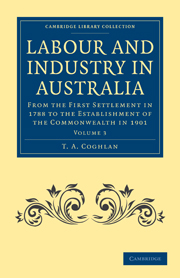 Labour and Industry in Australia
Labour and Industry in Australia Book contents
VII - THE MARITIME STRIKE OF 1890
Published online by Cambridge University Press: 07 October 2011
Summary
It will have been seen in the last chapter, treating of labour and wages, that the relations between capital and labour during the greater part of this period were fairly amicable; in 1890, however, there commenced a series of struggles carried on with great bitterness, which extended over several years, and have more or less affected the relations of employers and employed even to the present hour. The ostensible causes of these disputes were now one thing and now another, but behind them all was the determination of the trade unionists not to work with non-unionists, and to exact from employers the recognition of the unions as the only channels of communication between master and men in the event of a labour dispute arising. The majority of the masters resisted these claims and insisted on their right to deal with their individual workmen or their workmen as a body without the intervention of a third party, and to employ any person offering his services, whether he was a unionist or not. In effect, the struggle was as to whether trade unionism was to be made compulsory upon all workmen.
There were early indications that such a struggle was inevitable, and it seemed very likely that the first trial of strength would be between the shearers and the pastoralists.
The Shearers' Union was a most powerful organization with branches in all the eastern colonies, and it was a serious step when it announced its determination not to allow its members to shear in sheds where the union “slate” was not adopted.
- Type
- Chapter
- Information
- Labour and Industry in AustraliaFrom the First Settlement in 1788 to the Establishment of the Commonwealth in 1901, pp. 1591 - 1607Publisher: Cambridge University PressPrint publication year: 2011First published in: 1918


